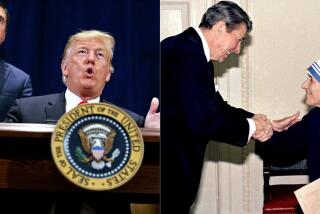Former Sen. Baker Tells of Anger at Poindexter, North : Reagan Is Termed Indignant at Ex-Aides
- Share via
WASHINGTON — Former Republican Sen. Howard H. Baker Jr. of Tennessee said Friday that President Reagan, who once called Lt. Col. Oliver L. North a “national hero,” has become indignant about North and Vice Adm. John M. Poindexter, the central figures in the Iran- contras scandal.
Baker, who indicated that he may have gotten his information from Reagan himself, said the President “has a pretty good bundle of anger, a pretty good head of steam about North and Poindexter.”
“I think he didn’t think so much of it” last November when the White House disclosed that Poindexter and North had been involved in diverting money to rebels in Nicaragua from the proceeds of secret arms sales to Iran, Baker said. “But I think as time goes on he (Reagan) has really worked up a head of indignation about that.”
Baker made his remarks at a breakfast session with The Times’ Washington Bureau.
Resigned as Adviser
Poindexter resigned as Reagan’s national security adviser and North, an aide to Poindexter, was fired. Both have refused to discuss the Iran-contras operation, invoking their Fifth Amendment right against self-incrimination.
Baker said a “legal authority” that he refused to name had advised Reagan that it would be an illegal abridgement of North’s and Poindexter’s constitutional rights for the President to exercise his power as commander in chief and order the two military officers to talk.
Baker, a lawyer, said he personally considered the advice “awful damn legalistic.” He said that if he had been President when North and Poindexter took the Fifth at congressional hearings, he would have ordered them to break their silence. However, he added that “I probably would have been wrong” and “civil libertarians would have roundly trounced me.”
Baker said he hoped that Poindexter and North would end their silence voluntarily--or that some arrangement could be made to grant them full or partial immunity from prosecution--because “it is exacting a terrible price from this President and from the country.”
Reagan Sought Advice
Baker, who served as Senate majority leader from 1981 until his retirement in 1984, indicated that Reagan had sought his advice on the current crisis, but he refused to give details.
“As you probably know, I don’t say what Presidents say to me,” Baker said. However, commenting on how Reagan has been affected by the scandal, he said: “It hits him hard.”
As for his own presidential aspirations, Baker said he had planned to make a decision this month on whether to enter the 1988 race but that the Iran-contras affair had forced a delay until spring.
“It would be foolish to make a final commitment until you know how the dust settles, what the factors are,” he said.
Baker said he thought that Vice President George Bush, whom he termed the “designated front-runner” for the 1988 GOP nomination, had been “diminished politically” by recent events but that he has “handled himself well so far.”
Challenge by Dole
He acknowledged that another hopeful, Sen. Bob Dole (R-Kan.), had mounted a strong challenge to Bush. But he contended that his own third-place ranking in some polls was “not a bad place to be . . . at this point.”
Clearly eager to see a splintering of the party’s right wing, the relatively moderate Baker said the budding candidacy of Patrick J. Buchanan, White House communications director, would seriously damage the efforts of Rep. Jack Kemp (R-N.Y.) and Pat Robertson, the TV evangelist, to build a conservative base.
Buchanan is “highly visible. He’s articulate. . . . He can strike sparks with audiences. . . . He is the most dynamic candidate” of the three, Baker said.
Baker said it is too early to lay out the issues on which he would run if he did join the race. However, he briskly dismissed the notion that a candidate should have “a burning reason” to seek the White House.
“You don’t need a fire in the belly. You musn’t be driven to run for President,” he said. “Indeed, I think those characteristics are disqualifying, and if I decide to run for President, it will be . . . on the basis of not only my personal feelings . . . but on whether I think I know where I would lead the country.”
More to Read
Sign up for Essential California
The most important California stories and recommendations in your inbox every morning.
You may occasionally receive promotional content from the Los Angeles Times.












